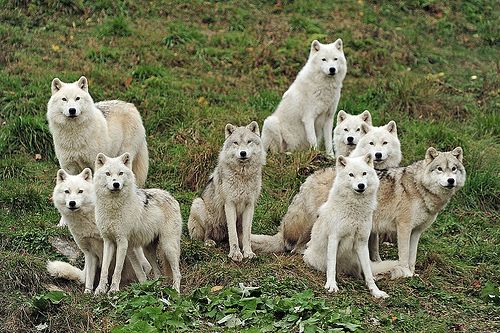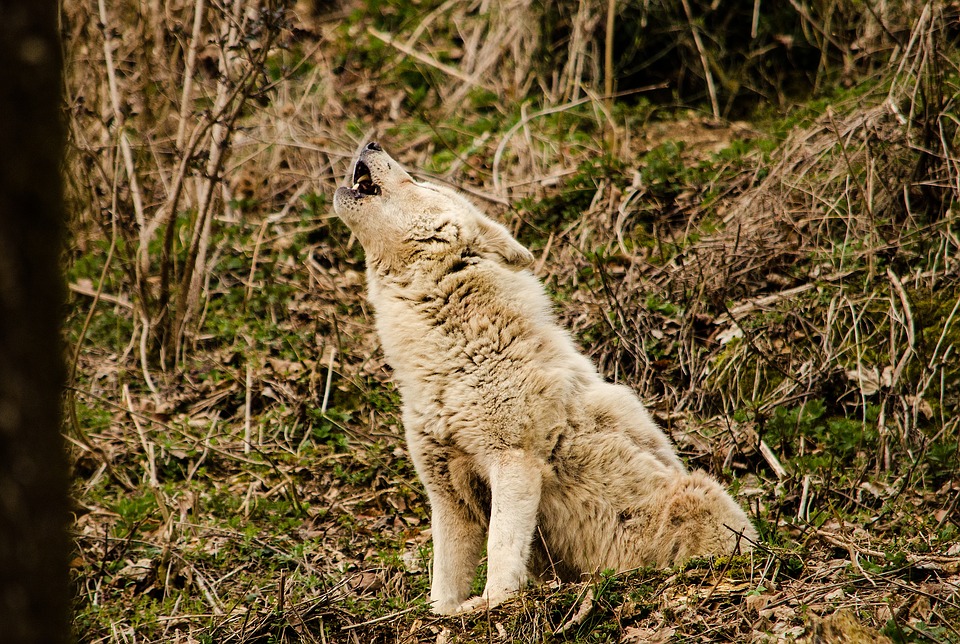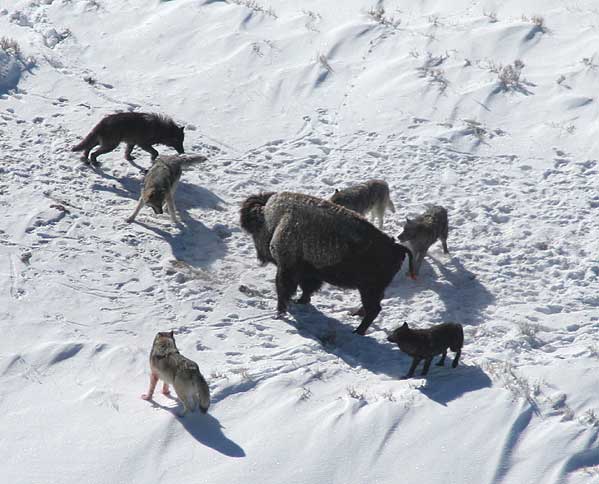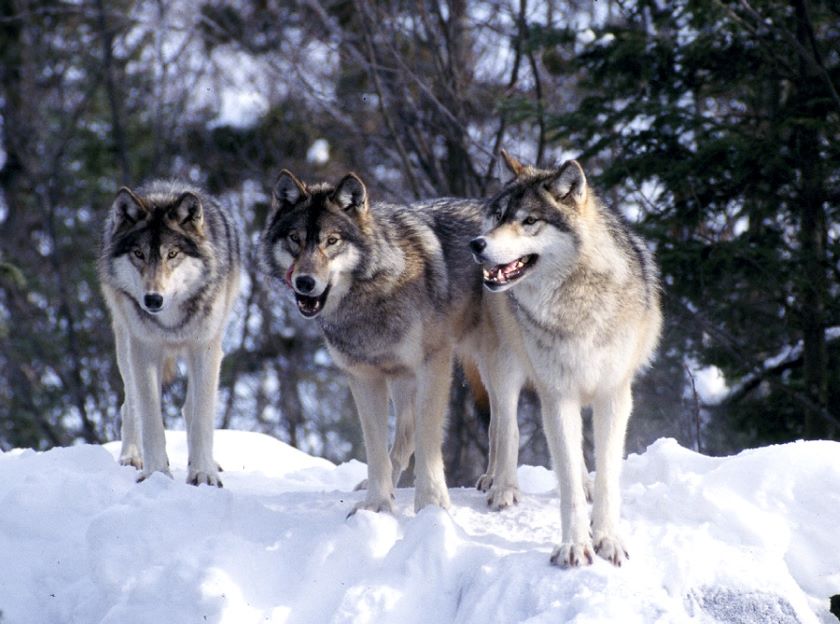
The Wisdom of Wolves
The term “pack dynamics” is common when speaking about wolves or other pack animals. But it is also used when referring to how a group of like-minded people act when in close confines of one another. It’s not as focused on the individual actions of the group, but more on the order of things. Most people do not understand that truly understanding pack dynamics can change their lives for the better. I realize that when any article starts out with a claim about how to improve your life, red flags go up, heads shake, and the gears upstairs start turning a little faster. Usually the thought pattern hovers around the belief/disbelief pathway; trying to determine the validity of the claim. Keep reading because this particular journey will be educational as well as enlightening. Once you’ve finished, it will be up to you to decide if the information meets the claim.
By now it’s easy to see that the “pack” referred to is none other than the wolf pack. Dangerous predators that hold claim to the top spot on the food chain in the wild. Wolves along with bears and cougars play prominent roles in nature. They have no natural predators themselves and are free to select, hunt, and kill as they choose. Many debates over which is the king of the beasts have occurred over time, especially since the bear is so large. Personally my money is on the wolves because they are pack animals and bears are usually loners. The hunting practices of the pack are fierce and violent, but also intelligent. They surround their prey and work as a team to finish the job, with each wolf having a role to fill. It might seem heartless to some; with a group attacking a single animal, but it’s by design as part of the natural order. Wolves benefit the eco-system by removing the weak and diseased animals and allowing the strong to survive and reproduce.

Meet Your Average Wolf Pack
Wolves live in packs, with an average of four to nine members. At times, the pack can grow to fifteen or more members. They live and hunt together in a territory that can range from fifty square miles to over one thousand square miles in certain circumstances. When a male wolf reaches the age of three, he can leave the pack to start his own pack or permanently bond with the existing pack. With ever changing numbers a hierarchy is necessary to maintain order within the pack, like a well-run household or organized small business, some wolves become leaders, others followers, but each understanding their role in the bigger picture. There are three main positions, Alphas, Betas, and Omegas. The Alphas are the CEO’s, the leaders of the pack and there is usually one male Alpha and one female Alpha. A mom and a dad make a great comparison. The Alphas are the decision makers and the ones who breed. Wolves mate for life. They commit to one another and stay committed, having four to six pups each year, teaching their young the rules of the world as they grow, and learning pack etiquette. As Mother Nature has her cruel streak, usually only half of the pups survive to adulthood.
The Alphas remain in their role all of their life. Other members of the pack are called Omegas; submissive wolves that end up being roughed up by other pack members but serve to break up tension as they try to mediate in stressful situations. Some Omegas will remain Omegas willingly all of their lives, just as some human beings are happy driving a taxi or doing landscaping work, these Omegas happily go through life dealing with the issues but not letting them break their spirit. Other Omegas will try to move up in the hierarchy of the pack by attempting to push the Omega mantle onto a pup, or by leaving the pack in hopes of joining another pack at a higher rank. Sometimes a male and female Omega meet as loners and form their own pack, mating and assume the Alpha roles they so desire.

The Beta role is a bit unique as some packs have Betas and other do not. It’s usually determined by the overall pack size. Larger packs have the need for an enforcer, a wolf which acts as second in command to the Alphas. The Beta backs them up, dealing out orders and helping to manage the hunting. Betas wolves are ambitious, and will usually end up challenging the reigning Alpha for pack leadership, or leaving to join an existing pack in an Alpha role or starting their own pack.
The Order of Things Among Wolves
So as we can see by this brief description, the pack mentality is more about order and less about ferocity and savagery. Other than their system of order, wolves demonstrate many things that human culture seems to struggle with; providing a learning opportunity should we choose to pursue it. In watching a pack travel from place to place, they do so in a single file line, with strong wolves making a path for the others to follow. This social unit can be led by either a male or a female Alpha. Hierarchy is not determined by gender, but by strength and the ability to win fights. Females can determine their own position in the pack, but as with humans, too many females can cause immense in-fighting. Regardless of the fighting and the dominant-submissive hierarchy, the pack mentality is one of extreme loyalty and devotion to one another.
Wolves are very nurturing and make sure that the young pups get their fill of food from the kill before anyone else eats. The fact that the pack is mostly made up of blood relatives helps explain much of the dynamic shown in the wild. All pack members care for the pups and also care for their sick or wounded. They also communicate in a most unique way, educating their young with the knowledge of generations of their forefathers on how to hunt and survive in any terrain. Through body language, scent, and vocalization, wolves “speak” to one another. And the iconic howling, well that’s the long distance call that helps to keep the pack connected when they get really spread out from a hunt or weather. It also serves as a reunion call, or a cry for help, or even in some cases, a lone wolf will be putting out a sad message on the wind, looking for companionship.

Lone Wolves are Just Lonely Animals
That “lone wolf” we also hear about, glamorized by Hollywood and sometimes admired by loners who seek the same fictional status doesn’t really exist. Wolves may go through periods where they are alone, but it isn’t by choice. If you see a lone wolf in the wild, it could be better classified as a searching wolf; one looking for a mate or a pack to join. Wolves are not interested in living the independent life, nor do they have the skill set or mentality to survive for very long doing so. Their very psyche drives them to be part of the pack, something greater than just a lone animal. They hunt as a pack, play, socialize, and exist as a pack. They stay together into old age and if they lose a member of the pack, they mourn.
Embracing the Wolf Pack Life
Wolves are amazing creatures, fierce and proud, but also nurturing and family oriented. They demonstrate a level of character that we as human beings would be wise to emulate. The family focus, the lifetime mating, the care for their children first and foremost, the care for their elderly, and their focus on educating the next generation of pups to take their places as leaders in their world are incredible qualities. But, like humans, they show a weaker side with in-fighting, clique-like hierarchies, and a bit of bullying. Yet they have no gender limitations, no caste-like brand which keeps them down for their entire lives. All it takes is a little hard work and determination to move up in their world.
Now that you’ve come along for the journey, I hope no one feels “train remorse” for taking the full ride. Maybe it wasn’t life-changing for you, but instead a positive reminder that we as human beings can be better. We can rise up over the pettiness of modern life. Collectively we can let the barriers and walls of sexism and racism crumble. There is a place where leaders are followed with devotion, not because of a bribe or political doctrine. True leaders look out for everyone with equal impunity. We can make sure that no person is that lonely howling wolf waiting for someone to find them. We can be inclusive, nurturing, and socialize in a harmonious and productive way. Now that’s a pack mentality that’s worth being part of.
Additional Reading
If you enjoyed reading The Wisdom of Wolves, and would like to read more from this author, here are some suggestions.
R.J. Schwartz is the owner and creative force behind The Gypsy Thread website. Use this link to go to the main page and explore articles on the unexplained, witchcraft, pagan history, and to find Full Moon and Pagan Rituals (all of which are free to use).
If you are a fans of poetry, creative writing, short stories, and more, visit the Creative Exiles website at this link. R.J. Schwartz is a writer and also owns the website. If you are a writer looking for a place to get started, contact him.
- March’s Full Worm Moon, 2024 - March 24, 2024
- Ostara 2024 – Celebrating Life - March 15, 2024
- Mysterious Waterfalls Around the World - February 16, 2024





3 Comments